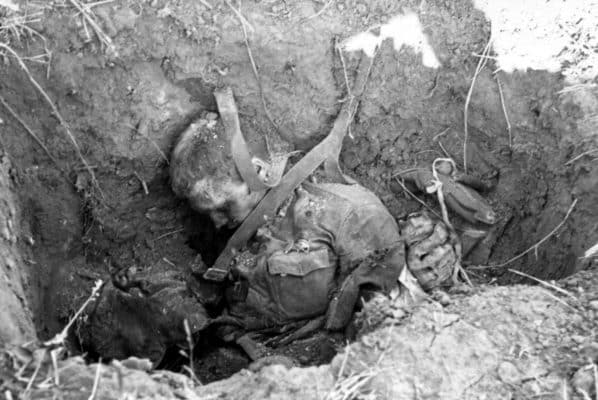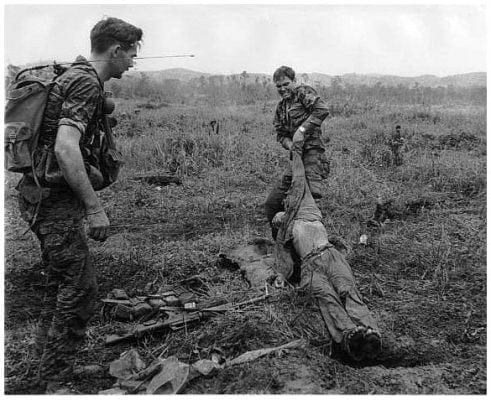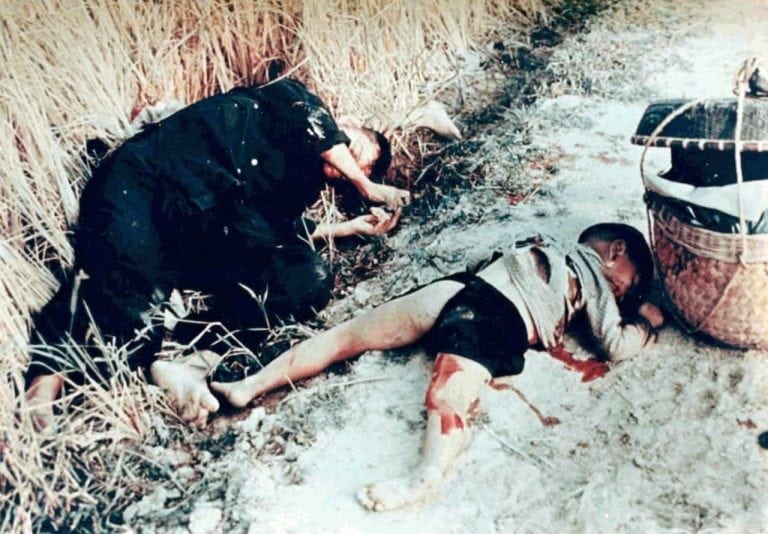Haunted by the Ghosts of War

Memorial Day, May 29th, is his birthday. He died defending his country. A true war hero, a naval officer, he risked his life to save his men. Like so many we should remember on Memorial Day, he goes before us as an exemplar of courage, real patriotism, and a witness to war’s brutality.
But remembering all the war dead is like drifting on a ghost ship in a still sea of burning water. Haunted by the eerie silence of their absent presence, if we listen closely enough, we can hear such victims calling to us: Remember me, Remember me, why did it have to be?
“All warfare is ghostly,” writes Norman O. Brown, “every army an exercitus feralis (a funereal exercise), every soldier a living corpse.”
The world is littered with the corpses of war’s victims, those of the killers and the killed, soldiers of every nation – but the vast majority are innocent civilians who never picked up a gun. The earth is so saturated with all their blood that one would expect the rivers to run red as a reminder. But that only happens in poems, as with Federico Garcia Lorca:
“Beneath all the totals, a river of warm blood.”

Russian soldier, in his foxhole. Stalingrad. (Source: The Greanville Post)
But what do poets know that the potentates, politicians, and mad generals don’t? These killers are experts at shedding innocent blood to satisfy their blood lust and then erecting monuments to the killers. They are necrophiliacs, while all the poets do is to remind us that we will all die and that we should affirm life and love each other before we do – that war is an evil lie, as Wilfred Owen told us:
If in some smothering dreams, you too could pace
Behind the wagon that we flung him in,
And watch the white eyes writhing in his face,
His hanging face, like a devil’s sick of sin;
If you could hear, at every jolt, the blood
Come gargling from the froth-corrupted lungs,
Obscene as cancer, bitter as the cud
Of vile, incurable sores on innocent tongues,—
My friend, you would not tell with such high zest
To children ardent for some desperate glory,
The old Lie: Dulce et decorum est
Pro patria mori.
But that was long ago. War’s victims still fall everywhere, every day they are stilled in deserts, mountains, jungles, cities, houses, hospitals, schools, on the open roads, in bedrooms, in woods, in alleyways, crouched in basements, killed from the sky, the ground, directly, remotely, by their own desperate hands, slowly in despair. Why count the ways, why count the victims – the truth is countless.

American casualty, Vietnam. (Source: The Greanville Post)
Yet we can remember a few that we know of and weep. Victims dead and victims alive.
There is that naval officer whose birthday I mentioned. He survived the south Pacific and Indonesian jungles only to die by enemy fire in an open car on a street in Dallas, Texas. Let us celebrate and mourn President John F. Kennedy, who would have been 100 years old today, while remembering how hard he fought for peace that the killers within his own government, led by the CIA, didn’t want then and don’t want now. So they shot him down “over here,” just as the U.S. war machine keeps killing millions “over there.” George M. Cohan was right: “The Yanks are coming.” They are always coming, but he was wrong to think it is ever over. It’s not supposed to be ever over.
Because he knew the horror of war and grasped the systemic evil of its proponents in his own government, John Kennedy grew out of the war machine – in James Douglass’s words from JFK and the Unspeakable: Why He Died and Why it Matters, when he was assassinated, JFK “was turning, Teshuvah, ‘turning,’ the rabbinic word for repentance,” against war and toward peace as his actions in the last year of his life make clear. As a result, the “unspeakable” deep state forces murdered him. But as a military veteran, his courage in turning against the war machine has inspired many other honorable veterans to do the same.
Like others who followed Kennedy – MLK, RFK, et al. – he died in his own country as a soldier in a non-violent “war” for peace and reconciliation for all people across the world. His enemies were here at home.
And “over there,” Maha Khalil, a one year old Iraqi girl, was killed in the first few months of America’s criminal war against Iraq. Mrs. Ngugen Thi Tau was slaughtered by U. S. soldiers at My Lai, Vietnam. Who knows all the dead in Afghanistan, Yemen, Syria, Libya, East Timor, Indonesia, Cambodia, El Salvador, etc? Who can grasp it? Their names mean nothing to those who didn’t know them, just as the endless names of the U.S. military dead (most drafted into a war they didn’t want or understand) that line the Vietnam Veterans Memorial are a sad blur to those who come to look but didn’t know the fallen. The same is even truer for anyone who views the Holocaust memorial in Boston where all one sees are rows and rows of concentration camp numbers; for every number a real person, each one reduced by the Nazis to seven-digits tattooed on arms. When we try to name and count war’s victims, we are overwhelmed and stunned. Yet the wars persist. Like the pawns conscripted to fight them, the anonymous ghosts of all the victims murmur in our ears: Why?
Dylan sings:
Oh my name it is nothin’
My age it means less
The country I come from
Is called the Midwest
I’s taught and brought up there
The laws to abide
And the land that I live in
Has God on its side.
But not all of war’s victim’s die. Vast numbers become “living corpses,” also mostly anonymous and forsaken. Across the world wherever the American war machine has set its sights, the lame and crippled struggle on, victims of bombs and bullets, napalm and white phosphorous, nuclear radiation, small pox – all the grotesque weapons the ghouls of the weapons’ industry have conjured up from hell for their paymasters. Countless living victims, yes, but the weapons industries carefully count their bloody profits, as do those who invest in these companies while turning a blind eye to their own complicity.

And the innocent, too, in great numbers. (My Lai massacre, Vietnam). (Source: The Greanville Post)
Many of the wounds of war are psychological and spiritual. And so many of the victims suffer silently. Often misused and abused by their own government, they suffer (to paraphrase Douglass Valentine in his book , The Hotel Tacloban, a son’s riveting tale of his combat veteran father’s haunting by war) “in an anguish so profound and so abiding that they live in torment ever after.” War’s terrors follow them everywhere down their nights and down their days, and they can often find no escape from the nightmare images that populate their minds, flashing in and out. It’s beyond imagining the living hell of children worldwide reliving the sight of the bloodied mangled bodies of their parents at their feet, victims of bombs or death squads or perhaps “collateral damage,” as if any words or reasons could undue their everlasting trauma.
We owe it the wounded, dead, and tormented war victims everywhere to memorialize them with the words:
War is a lie, and only truth will free us.
Then we must devote ourselves to ending war. Each of us is responsible.
Edward Curtin is a writer whose work has appeared widely. He teaches sociology at Massachusetts College of Liberal Arts. His website is http://edwardcurtin.com/
Featured image: The Greanville Post

